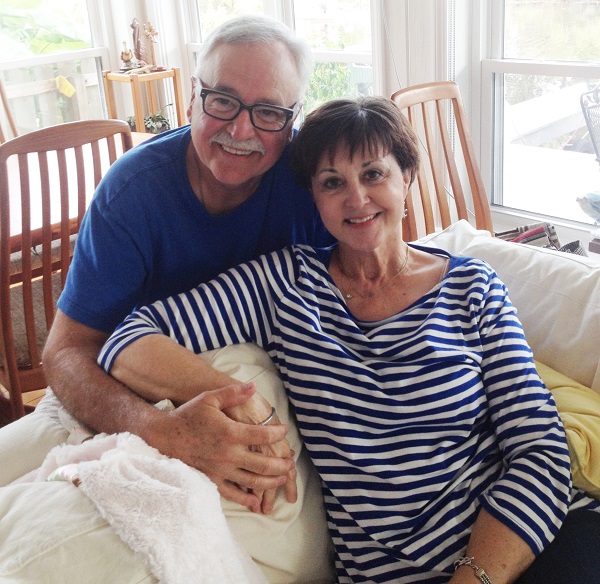Cheryl’s Story: Facing Each New Day with Optimism
Cheryl Campbell was proactive about breast cancer screening. Her grandmother and great-grandmother both had the disease.
For years, she checked in annually with a breast specialist who performed a mammogram, a manual breast exam, ultrasound and digital infrared thermal imaging (DITI), which reveals temperature differences on the surface of the breasts. A CEA blood test was also part of her screening menu.
Her doctor explained that CEA is a type of protein in the body and some types of cancer can cause it to rise. Though primarily used to monitor how well cancer treatments are working, research indicated it may be a valuable screening tool to detect cancer. And, indeed, that was the test that indicated that Cheryl might have cancer – not in her breasts, but in her lung. CT and PET scans confirmed it.

“You could have blown me over with a puff,” Cheryl says, thinking back to when she received the news. “I was doing everything right. I eat healthy, I didn’t drink, I never smoked – and I had no risk factors for lung cancer,” she said.
Born in Mississippi, Cheryl has lived most of her life in Baton Rouge. She and her husband, Frank, raised two daughters. She was enjoying a successful career as a realtor when the diagnosis disrupted her life.
When she was referred to Medical Oncologist Dr. Gerald Miletello with Hematology Oncology Clinic, his name was familiar to her. “He has a phenomenal reputation in the community,” she said.
Cheryl did her research before her first visit. “I read a lot,” she says, adding that she’s the kind of person who gathers lots of information upfront “and then I’ll deal with it.”
It turns out she and Dr. Miletello were a great match. “He tells us all how it is,” Cheryl said. “He’s such a positive person and he doesn’t allow negativity to take over. He truly cares for his patients and doesn’t give up.”
‘Caring’ is how Cheryl describes the entire HOC team, whose clinical staff sees patients at its main location at 8595 Picardy Avenue and a satellite location in Zachary. “It’s a wonderful community-based practice and everything you need is right there,” said Cheryl. “They take you in and get your labs done; then you see the doctor and go for treatment, if needed. The pharmacy is onsite, and your next appointments are scheduled and on your calendar before you leave. It’s almost seamless.”
Cheryl is also a fan of HOC’s recent partnership with American Oncology Network, an alliance of physicians and veteran healthcare leaders partnering to ensure the long-term success of community oncology. “The benefit to patients has been phenomenal,” Cheryl says. “They’ve linked me with a care manager who calls to check on me between appointments and a pharmacist who also calls regularly to monitor my progress. They always take the time to answer my questions. I feel they are my friends.”
Cheryl has experienced a variety of treatments, including surgery, since her diagnosis seven years ago. While her initial treatment worked very well and enabled her to resume her activities, it eventually stopped being effective and her cancer metastasized. She expertly describes the various combinations of immunotherapies and drug cocktails that have followed.
Dr. Miletello is convinced that Cheryl’s overall good health has enabled her to tolerate certain treatments with relative ease. A self-described “Pollyanna,” she credits her strong support system, which includes her faith community and prayer warriors around the world and, of course, her dedicated husband.
“He takes me everywhere,” said Cheryl. “In fact, he’s termed himself my ‘du-ber’ driver, a step above the typical Uber driver,” she says with a laugh.
Cheryl’s health outlook remains as positive as her mindset. She was recently placed on an oral oncolytic medication which targets specific cancer cells. “Almost immediately, it reversed my lethargy, and my oxygen levels are very strong,” she reports. “I feel much better overall.” That’s good news for the spunky grandma who enjoys spending time with family, including her children and four grandchildren.
The use of oral oncolytics – targeted therapies that are taken in an oral form for the treatment of cancer, have increased substantially in the past several years, giving physicians and patients many more choices. “It’s becoming more like managing a chronic disease in many patients,” said Dr. Miletello. “The future of cancer treatment is very promising.”
And, as Cheryl says, “It’s all good.”
Note: Cancer patient outcomes and experiences may vary, even for those with the same type of cancer. An individual patient’s story should not be used as a prediction of how another patient will respond to treatment.





